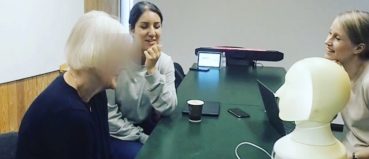
Workshop: Robotic failures in health and social care: Improving HRI design based on empirical insights on human needs, emotions and engagement
When: November 23rd, Wednesday, 2022 (10 am – 5 pm)
Where: Digital Futures Hub at KTH Campus
Adress: Osquars Backe 5, floor 2. SE-100 44 Stockholm, Sweden
Today, a diversity of robots are being used in many different care settings: ranging from surgical robots in hospitals to companion robots as part of care for the elderly. As robots move out of the lab and into real-world settings, they face the challenge of having to adapt to a complex and shifting environment: a challenge which is currently being tackled by roboticists through emphasizing the need for context awareness and personalisation.
Robust design and sound engineering do not necessarily result in a high uptake of robotic systems in health and social care. In fact, many of these systems eventually fail to reach long-term user engagement, potentially because they fail to consider some of the complexities that characterizes real-world care environments; where the staff and patients ideas of what ‘good’ care entails become entangled with organisational structures and demands (e. g., patient safety, care relationship, quality of care).
This workshop called ‘Robotic failures in health and social care: Improving HRI design based on empirical insights on human needs, emotions and engagement’ aims to provoke a discussion of robot failures in health and social care to design and implement robotic systems in health care in a practically feasible, as well as ethically sustainable, way. We invite researchers from interdisciplinary fields such as Human-Robot Interaction, social sciences, psychology and medical engineering to discuss:
-
- How, and why, do robots fail when they enter real world care environments?
- What specific aspects of care environments do roboticists have to take into account when designing robots intended to be utilized in these settings?
- What methods could be adopted in order to transfer and communicate empirical findings into the work of those who design and develop care robots?
The workshop will be held on 23rd November, Wednesday, 2022 (10 am – 5 pm), in the cozy open space environment of Digital Futures Hub at KTH Campus (Osquars Backe 5, 2nd floor, Stockholm). It will consist of invited talks, networking games and directed discussions centered around the above-mentioned questions. The emphasis will be on the latter, as our aim is for all participants to be actively engaged and have the opportunity to expand their network and establish possible future collaborations.
The event will have limited number of participants. Registration is free and can be made through the following link:
https://docs.google.com/forms/d/e/1FAIpQLScr2VA9ZM5TaceSdnGgjtxQgiHoPJFGYptFgh8UPZyx4t3fXg/viewform
Programme, Wednesday 23rd November
10:00 Welcome and Introductory Words on Interactive Flow
10:10 Speed Networking Game
10:20 Idea, Experience, Failures and Critics Sharing & Q&A
-
-
-
- Bipin Indurkhya, Professor of Cognitive Science, Jagiellonian University, Poland: “In-the-Wild Observations on The Role of Surprise in Child-Robot Interaction”
- Sofia Thunberg, PhD Student in Cognitive Science, Linköping University, Sweden: “Social Robots are Not for Everyone – Differences Among End Users”
- Maria Arnelid, PhD Student, Linköping University, Sweden & Mikaela Hellstrand, PhD Student, KTH, CBH, Sweden: ‘Experiences and gains of utilizing an ethnographic approach when investigating care robots’
- Arzu Guneysu Ozgur, Digital Futures Postdoctoral Fellow, KTH, RPL: “Health care professionals’ perception of robots”
- Bipin Indurkhya, Professor of Cognitive Science, Jagiellonian University, Poland: “In-the-Wild Observations on The Role of Surprise in Child-Robot Interaction”
-
-
11:40 Research Pitches from Attendees
12:00 Discussions on Challenges
12:45 Creating a Challenge Board
13:00 Lunch
14:00 Research pitches from attendees
14:20 Idea, Experience, Failures and Critics Sharing & Q&A
-
-
-
- Hatice Gunes, Professor of Affective Intelligence and Robotics, University of Cambridge, UK, Title TBA
- Youssef Mohamed, PhD candidate, KTH, RPL, Sweden: “Multimodal Social Robotic Systems in Healthcare“
- Bahar Irfan, Digital Futures Postdoctoral Fellow, KTH, TMH, Sweden: “Behind the Scenes of Putting Autonomous Personal Robots in the Wild”
- Björn Fischer, PhD, KTH, CBH, Sweden: ““Who are the robot and AI users? How business practices can perform future consumer markets“.
-
-
15:20 Fika & Networking Game
15:45 Discussions on solutions and methodologies
16.40 Ideation and Possible Collaborations
17:00 Closing and moving to dinner
18:00 Dinner
Organizers:
Youssef Mohamed, KTH, Division of Robotics, Perception and Learning
Mikaela Hellstrand, KTH, Department of Biomedical Engineering and Health Systems
Arzu Guneysu Ozgur, KTH, Division of Robotics, Perception and Learning
Sanna Kuoppamäki, KTH, CBH, Department of Biomedical Engineering and Health Systems
The event is funded by KTH Life Science Platform.